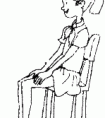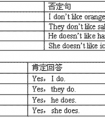Read and complete.1.is she going to there? By train or by bus?2. I b some presents on my holiday.3. Do you like h?4. I'm ra story book.5. My friend a-六年级英语
题文
| Read and complete. |
| 1. is she going to there? By train or by bus? 2. I b some presents on my holiday. 3. Do you like h ? 4. I'm r a story book. 5. My friend a good food on his holiday. 6. I'm going back to C next month. 7. She likes drawing p____. 8. I often go to s on foot. 9. I w to the zoo yesterday. 10. He likes p football. |
答案
| 1. How 2. bought 3. holidays 4. reading 5. ate 6. Canada 7. pictures 8. school 9. walked 10. playing |
据专家权威分析,试题“Read and complete.1.is she going to there? By train or by..”主要考查你对 一般过去时,动词过去式,单词、词组,复数名词,现在进行时,现在分词,动名词 等考点的理解。关于这些考点的“档案”如下:
一般过去时,动词过去式单词、词组复数名词现在进行时,现在分词动名词
考点名称:一般过去时,动词过去式
一般过去时:
表示过去某个时间里发生的动作或状态;过去习惯性、经常性的动作、行为;过去主语所具备的能力和性格。
be动词在第一人称是单数和第三人称是单数是用was,其余用were。
a. 表示在过去时间里所发生的动作或存在的状态,常与表示过去的时间状语。
yesterday(昨天)、last week (上星期)、an hour ago(一小时前)等连用。
例:I went to the zoo with my father last Sunday. 上周日我和我爸爸去动物园了。
They weren't able to come because they were so busy.他太忙了,所以去不了。
b. 表示在过去一段时间里,经常性或习惯性的动作或状态。
例:My brother watched the World Cup every day last month.上个月哥哥每天都看世界杯比赛。- 一般过去时句法结构:
肯定形式
主语+动词过去式+其他
例句:She often came to help us in those days.
否定形式
①was/were+not;②在行为动词前加didn't,同时还原行为动词
例句:I didn't know you like coffee
一般疑问句
①Did+主语+do+其他? ②Was\Were+主语+表语?
例句:Did I do that?
用表格整理如下:肯定式 疑问式 否定式 疑问否定式 Iworked Did I work? I did not work Did I not work? He(She,It) worked Did he(she,it) work? He(she,it) did not work Did he(she,it) notwork? We worked Did we work? We did not work Did we not work? You worked Did you work? You did not work Did you not work? They worked Did they work? They did not work Did they not work?
结构句型:
1.一般句子
I watched TV last night.
2.一般疑问句
Did you watch TV last night?
3.there be 句型
There was an apple on the table last night.
Was there an apple on the table last night - 一般过去时用法口诀:
一般过去时并不难,过去动作、状态记心间。
动词要用过去式,时间状语句末站。
否定句很简单,didn't 站在动原前,其它部分不要变。
一般疑问句也好变,did放在句子前,主语、动原、其它部分依次站。
特殊疑问句也简单,疑问词加一般疑问句记心间。
最后一条请注意,动词过去式要牢记! - 过去式和过去分词的构成表:
不规则变化的动词过去式:词
构成
举例
一般情况
词尾+ed
动词原形
过去式和过去分词
look
talklooked
talked以不发音字母e结尾
词尾+d
like
arriveliked
arrived以“辅以字母+y”结尾
变y为i,再加ed
fly
studyflied
studied以重读闭音节结尾,且末尾只有一个辅音字母
双写词尾+ed
stop
planstopped
planned
have---had are---were get---got say---said feel---felt do/does---did is---was go---went drink--drank eat--ate bring----brought think----thought
buy----bought catch---- caught teach ---- taught sit----sat wear----wore cut----cut sweep----swept sleep——slept become----became
考点名称:单词、词组
- 主要是对单词、词组的一些理解掌握,集中出现的题型有:找出不同类的单词、判断正误、单词词组的英汉互译等。
- 小学英语单词记忆法:
在小学英语教学中,记忆单词是学生学习的最大障碍,尤其是低年级的学生,刚刚接触英语,死记硬背下来的方法既吃力,又很容易遗忘,掌握英语单词量的多少,直接影响着学习效果。
一、拼音式记忆法
如:数字“十”ten,可以让学生联想成ten的拼音发音。男人们“men”汉语拼音便是men……
二、谐音记忆法
1.单词读音谐音法
可能老师们都已经发现,刚接触英语的小学生会在你教的单词下面写上相应的汉语“谐音”(和汉语相仿的读音)大部分老师会阻止孩子们这样的行为,但我不认为这是错误的,我会根据他们的思路继续引导,在谐音的基础上画图、联想,三者结合,这样对单词的记忆就非常深刻,如:apple单词的汉语谐音是“阿婆”画图“一个阿婆手里拿着一个苹果”联想,看到图画联想到apple的读音,汉意。
- 最新内容
- 相关内容
- 网友推荐
- 图文推荐
| [家长教育] 孩子为什么会和父母感情疏离? (2019-07-14) |
| [教师分享] 给远方姐姐的一封信 (2018-11-07) |
| [教师分享] 伸缩门 (2018-11-07) |
| [教师分享] 回家乡 (2018-11-07) |
| [教师分享] 是风味也是人间 (2018-11-07) |
| [教师分享] 一句格言的启示 (2018-11-07) |
| [教师分享] 无规矩不成方圆 (2018-11-07) |
| [教师分享] 第十届全国教育名家论坛有感(二) (2018-11-07) |
| [教师分享] 贪玩的小狗 (2018-11-07) |
| [教师分享] 未命名文章 (2018-11-07) |

![Yesterdayhe hiskeys,sohecan'tgohome.[ ]A. losedB. lostC. losesD. losted-六年级英语](http://www.00-edu.com/d/file/ks/4/1/51/2019-08-24/small56b740c860ea72171119a747c83813f51566588119.gif)

![I ____________ to the store on Sunday. [ ]A. goB. went-五年级英语](http://www.00-edu.com/d/file/ks/4/1/51/2019-08-24/smallb5041caaeb2961272b3d1491492e45251566588603.gif)


